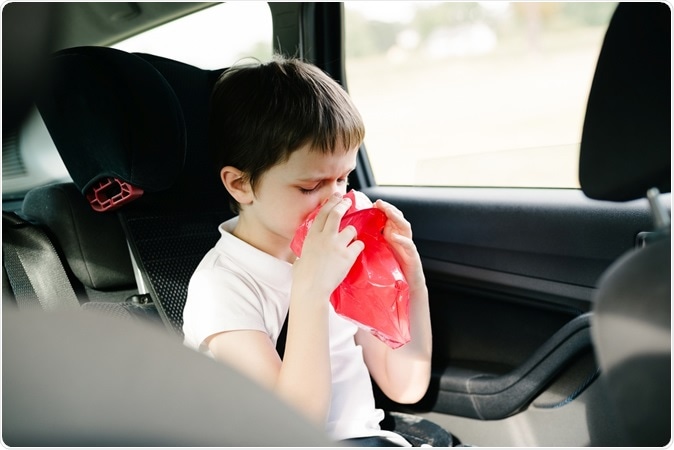Most kids vomit easily and often copiously and frequently. This is a global phenomenon most parents have resigned themselves to. Researchers have now tried to understand why kids vomit so commonly and if there is actually any reason for parents to panic. An article by Erin Blakemore for NPR looks to answer the question.

Image Credit: Plantic / Shutterstock
Vomiting or emesis as it is medically known, is same in children as well as in adults say medical experts. There may be triggers such as motion sickness, certain medications, unpleasant sights or smells, viruses that may irritate the inside walls of the stomach, overfeeding etc. In children the sensitivity of the vomiting centre in the brain is higher than in adults that results in frequent vomiting.
The stomach nerves are called afferent nerves. When these are stimulated, they send signals to the brain telling it to start a vomiting reaction to expel what has been ingested. Once triggered, the opening of the lungs and airways or the larynx shuts off after a deep breath and the upper palate rises while the glottis folds back. The diaphragm pushes the contents of the abdomen by pushing down. This creates a negative pressure that opens up the esophagus or the food pipe. The food from the stomach heaves back via the esophagus outside the body in a forceful flow of vomit as the abdominal walls tighten to provide additional force.
In children the triggers are much more innocuous than in adults. This includes a fever, a viral infection or even a painful stimuli or an emotional upset. Paediatricians like pediatric gastroenterologist Katja Kovacic explains that for children the causes can be numerous. Stomach flu or food poisoning could be one of the commonest causes but there may be harmless causes of vomiting in children as well.
According to paediatricians the best thing to do when a child vomits is to clean up and make the child comfortable. Fluid intake is vital to prevent dehydration. IF there are certain warning signs such as excessive drowsiness, lethargy, distended abdomen, abdmoninal pain that is severe, any other severe pain etc., the parents and caregivers should seek medical attention says Kovacic. Vomiting that is excessively forceful or very frequent and does not seem to ease within a day is also a red flag says Koacic because it may have an underlying surgical cause and also lead to dehydration. Other experts warn that blood in the vomit, dark green bile, or fecal matter in the vomit may indicate an obstructed bowel and needs immediate medical attention.
Kovacic says that frequent vomiting could also indicate a condition called cyclic vomiting syndrome where there are repeated bouts of vomiting that can last for several hours at a time. The cause is not known but some children may benefit from anti-migraine drugs says Kovacic. Migraine in adults could manifest as repeated vomiting episodes in children say experts.